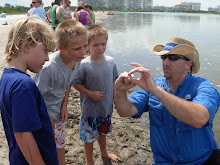 |
| One of many dead manatees found during the record 2010 cold event. |
 |
| Manatee "foot print" |
For instance, manatees typically seek warm-water refuge near power plants, springs, and rivers as water temperatures decrease. Boaters should keep a close look out for the marine mammals moving into coastal waters to reach theses areas, and strictly obey all posted speed restrictions and manatee protection zones to avoid potential vessel strikes. Wearing polarized sunglasses will help spot manatees and boaters should watch for manatee “foot prints” (large tell-tale circular slicks on the water’s surface) that indicates the presence of the animal.
Manatees and other marine life such as sea turtles can quickly become disorientated and stressed when exposed to colder water temperatures for extended periods of time. Symptoms of a cold-stressed manatee can include but are not limited to white skin around the face, flippers and tail and/or deep grooves on the underside from the animal using significant amounts of their fat stores in order to keep warm. Sea turtles tend to float listlessly in the water or wash onto shore when they are cold stressed.
If you encounter an injured or dead manatee or other wildlife you are encouraged to call the Florida Fish and Wildlife Conservation Commission’s (FWC) Wildlife Alert Hotline: 1-888-404-FWCC (3922).** Due to limited resources wildlife officials may not be able to respond to your call immediately. If it is possible, keep an eye on the animal in question and document its condition as well as its location. The more specific information you can provide officials, the more prepared they will be in their rescue attempt.
 |
| A dead mullet washed up on shore |
Fish affected by the cold may appear lethargic and may be seen at the surface where the water may be warmer from the sun. It is important to remember all recreational fishing regulations still apply to fish affected by cold temperatures. Even if you come across a dead or dying fish that is legal to keep, it is never recommended to eat any fish that appears sick or is already dead due to elevated bacterial levels and associated heath concerns.
Reporting fish kills that occur in natural water bodies is an important step in helping to protect Florida’s fisheries. These reports help state scientists keep track of the location and extent of fish kills in natural lakes and estuaries, and to see if there are problems developing in an ecosystem that might require investigation or restorative measures. To report fish kills that occur in natural water bodies call the FWC Fish Kill Hotline:1-800-636-0511 or visit http://research.MyFWC.com/fishkill/submit.asp




No comments:
Post a Comment